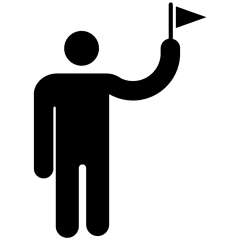Best Careers for History Majors
Whether you're just starting your bachelor's or have already graduated, you're probably tired of hearing it: "What can you do with a history degree?"
History graduates are often told they'll never find a career, but, in reality, the opposite is true. Over the course of their degree, history majors learn more than just facts. They also develop strong critical reasoning and communication skills, build a broad understanding of societal trends over time, and learn to approach problems with an open mind. By the time they graduate, they've also gained excellent work habits, including an ability to work well independently and in teams, to structure their own time, and to prioritize effectively. Armed with these valuable traits, it's no surprise that history graduates earn more, on average, than any other humanities or liberal arts major.
Tired of hearing your history degree won't get you anywhere? Let's take a look at some of the top jobs for your major.
This article will be covering the following careers:
| Career | Avg Salary | Satisfaction | Your Match |
|---|---|---|---|
| Lawyer | $129k | 2.7/5 | |
| Tour Guide | $26k | 3.6/5 | |
| Journalist | $55k | 3.5/5 | |
| Historian | $72k | 3.6/5 | |
| Archivist | $44k | 3.3/5 | |
| Writer | $9k | 4.1/5 | |
| Librarian | $51k | 3.3/5 | |
| Editor | $37k | 3.4/5 | |
| Teacher | $40k | 3.1/5 | |
| Exhibit Designer | $61k | 3.8/5 |
Are these careers suited to you? Our comprehensive career test measures your personality traits and interests and matches you to over 800 careers.
1. Lawyer
It may come as a surprise, but pursuing a career in law is one of the most common next steps for a history degree major. This is because history students already possess many of the skills required to succeed as lawyers: an ability to analyze and synthesize large amounts of information, and build compelling arguments from historical data. Of course, this career path requires several years of additional education, but for the right person, it can be well worth the effort.
2. Tour Guide
Historical tour guides are natural storytellers who use their knowledge to bring ancient cities, ruins, or museum artifacts to life. They help tourists, travellers, and other curious minds deepen their understanding of their surroundings, guiding them as they explore by bicycle, bus, boat, or on foot. With a love of historical information and a broad knowledge of ancient civilizations or cultures, no one is better suited to this career than a history major.

Tour Guide
A tour guide provides assistance, information, and guidance to individuals or groups of tourists during their travels.
3. Journalist
Over the course of their degree, history majors learn to review, analyze, and synthesize large quantities of information—a skill that will serve them well in a career in journalism. In this role, they'll enjoy scouring press releases, interview transcripts, books, notes, and other information to get to the heart of the issue at hand. They'll also excel at weaving their findings into compelling narratives, and contextualizing news stories within the larger societal context. Better yet, while a journalism degree is an asset in this career, it isn't required. With the right experience and a bit of hard work, history majors will find their way to success in no time.

Journalist
A journalist gathers, writes, and shares news and information with the public through newspapers, magazines, websites, television, or radio.
4. Historian
Few people understand what, exactly, a historian is or what they do on a daily basis. But for history majors who have truly fallen for the subject, this is one of the most rewarding careers around. More than 70 percent of historians work in university or college settings, where they conduct historical research and teach classes to graduate and undergraduate students. Many specialize in a given region or period, such as the US civil rights movement or China under Mao Zedong's rule. But whatever their specialization, all historians share a love of the past and an even greater love of learning.

Historian
Historians are scholars who study and interpret the past, examining historical records, events, and developments to understand and explain human societies' evolution over time.
5. Archivist
Archivists are professional preservers of the past. These methodical and highly organized professionals work in settings such as museums, government organizations, medical facilities, and historical societies. There, they perform a wide array of tasks, including acquiring and processing new collections, preserving electronic methods or audiovisual materials, and assisting researchers with their research. Depending on the setting, the job may also include managing or digitizing records, doing public outreach, or teaching. History majors, with their strong research skills and deep appreciation of the past, can thrive in this intellectually stimulating career.

Archivist
An archivist is responsible for the preservation, organization, and management of historical records and documents.
6. Writer
Success as an author requires many of the skills history majors possess: a dedicated work ethic, excellent written communication skills, and the ability to work well independently. Authors usually focus on a particular literary genre or age group, such as picture books, creative nonfiction, or psychological thrillers. Although history majors can excel in many of these specializations, they are particularly well-suited to the genres of historical fiction, memoir, and history.
7. Librarian
For students whose love of history extends to a love of learning, a career in library studies is a natural fit. Librarians work in schools, public institutions, medical facilities, and many other settings. Whatever their specific role, their core responsibility is always to help their patrons access and use information, be it in the form of books, audio recordings, newspaper clippings, or journals. Although a master's degree in library science (MLS) is required to become a librarian, history majors already have the critical thinking, research, and communication skills required to excel in this profession.

Librarian
A librarian is responsible for organizing, managing, and providing access to information resources in a library setting.
8. Editor
Most history majors graduate with excellent critical thinking abilities and knack for synthesizing information—valuable assets in any writing career. They make talented editors, a position in which their communication skills, attention to detail, and love of facts can truly shine. Editors can be found in a variety of industries and settings, working on everything from textbooks to movie scripts, instruction manuals to websites. History majors can truly find their home in this career, especially if they can specialize in content that genuinely sparks their interest.

Editor
Editors oversee the preparation and refinement of written, visual, or multimedia content for publication or broadcast.
9. Teacher
It's a bit of a stereotype, but it's true: becoming a teacher is a viable option for any history graduate. In this profession, history majors can truly shine, using their knowledge and enthusiasm to inspire others to fall in love with the subject. Although becoming a high school history teacher may require additional education and experience, obtaining a degree in history is an ideal place to start.

Teacher
A teacher serves as a guide, mentor, and facilitator in the learning journey of students.
10. Exhibit Designer
When museums plan a new exhibit, such as "History of Buddhism in North America," they often hire agencies who specialize in exhibit creation. These agencies work with small teams of curators, exhibit designers, and content developers to research, plan, design, and implement all aspects of the show. History majors—with their writing skills, research abilities, and knowledge of historical periods—are perfectly equipped for this creative job.

Exhibit Designer
An exhibit designer is responsible for conceptualizing, designing, and implementing exhibitions and displays for museums, galleries, trade shows, and other public spaces.

